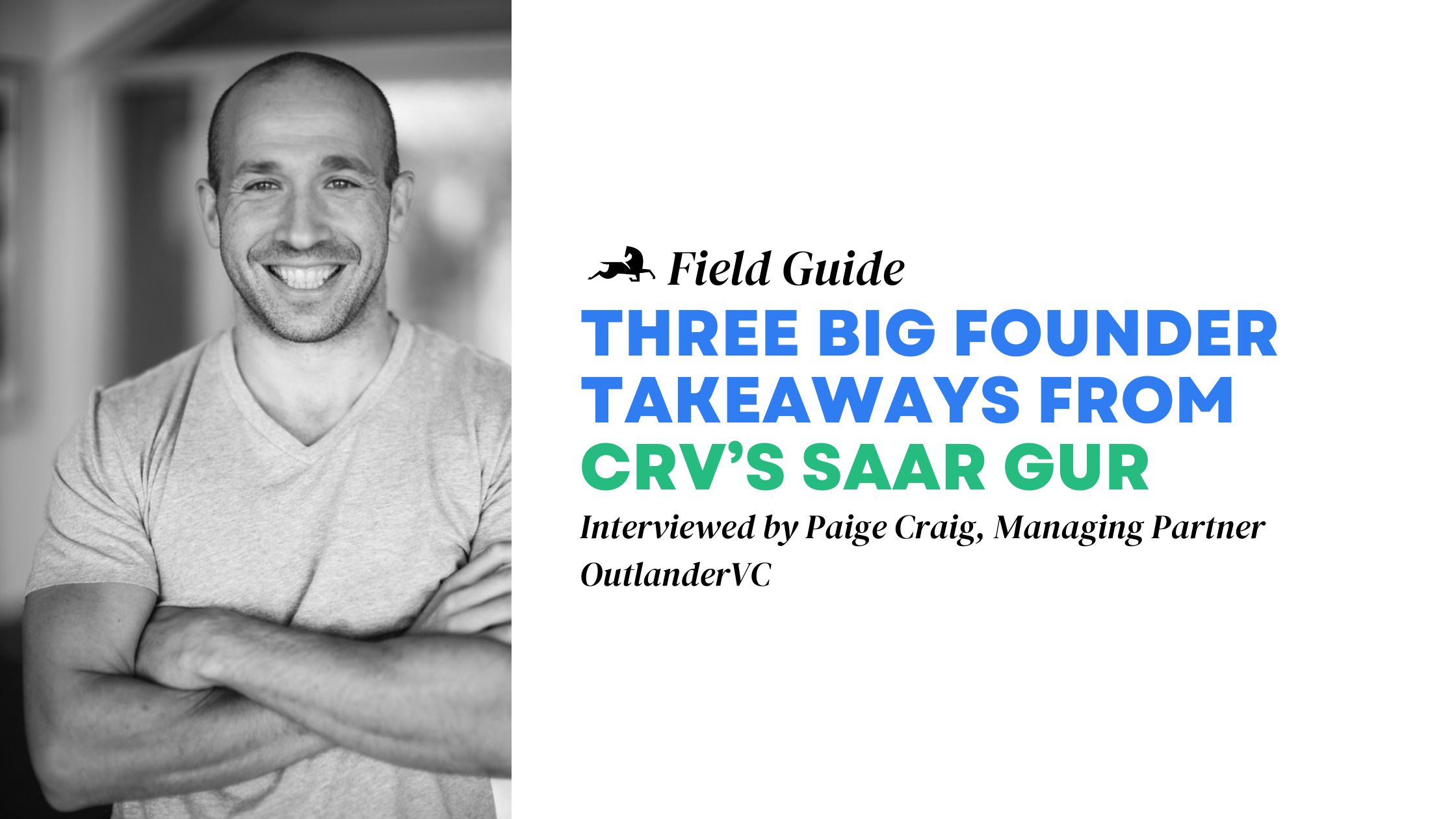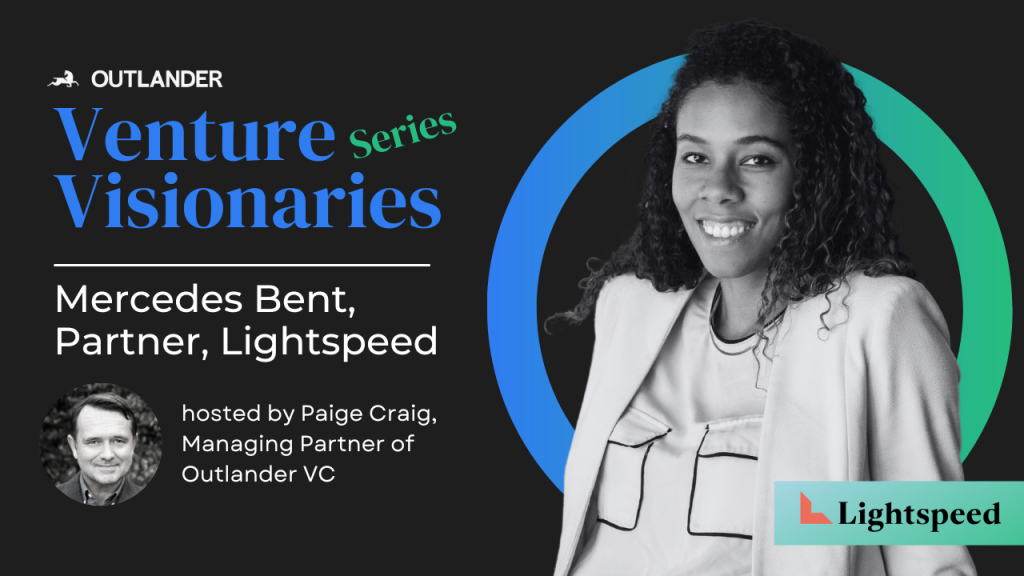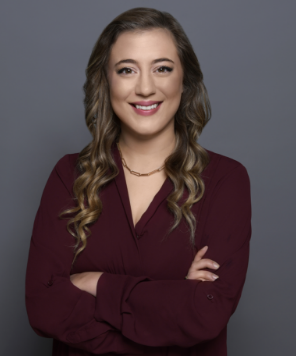Three Big Founder Takeaways from CRV’s Saar Gur
Posted by: AJ Smith
Posted on 04/26/2024

Posted by: AJ Smith
Posted on 04/26/2024

Welcome back to Venture Visionaries, a new series brought to you by Outlander VC. Hosted by Paige Craig, Managing Partner at Outlander VC, this series explores what sets these investors apart and provides unique insights into their perspectives on the startup world. Join us as we sit down with some of the most influential investors in the industry, uncovering the secrets behind their success and learning how they navigate the ever-changing landscape of investing.
From their investment strategies to their predictions for the future, we’ll bring you inspiring conversations that’ll resonate with aspiring entrepreneurs and anyone curious about the world of venture capital.
This month, we had the pleasure of sitting down with CRV’s Saar Gur, who has invested in household-name companies like DoorDash, Ring, Patreon, and AirTable. Below, you’ll find three of our favorite takeaways from that conversation, but you can also watch the full interview here. Let’s dive in!
One of the standout messages from our conversation with CRV’s Saar Gur was that when he invested in Patreon, DoorDash, and Ring, for example, they weren’t obvious. In Gur’s own words, they were actually, “pretty funky” at the time.
But Gur has found a lot of investment success in looking towards the weird and wonderful, to the less obvious solutions that have early utility and could therefore make a convincing case of mainstream viability. In some cases, Gur argues that “the weirder the better,” because these differentiating qualities capture attention. It can also help founders make a stronger case for why their solution is going to come out on top. “Doing AI for customer support makes a ton of sense [but] it’s not totally clear to me why a startup is gonna win that.” So when founders can be bold enough for their solution to be different, not obvious, and then demonstrate that it’s not just a dream, but that there are early signs of product-market fit – that’s where the magic happens.
As a complete, non-tech, real-world example, Gur talked about how teaching yoga on Stanford’s campus was illegal 20 years ago and now there are more yoga studios in Palo Alto than traditional gyms. What used to be a “weird,” fermented drink called kombucha 15 years ago is now sold at Seven Elevens. Now compare this with Ring – founder Jamie Simiofff was famously rejected on Shark Tank in 2013, but his “weird” DoorBot eventually transformed home and community security, selling to Amazon for a monumental deal in 2018.
The big takeaway: dare to be weird, but also be useful.
To really catch Gur’s eye, he has to believe that the market opportunity is massive. “A lot of passing happens where I just can’t see how this can be a huge business […] we’re looking for businesses that can generate billions of dollars in revenue.” He loves commercially-oriented founders who are deeply in touch with the problems they are solving, are so obsessed that they will teach him something new (that’s his favorite part of the job!), and can see market opportunities from new angles. These traits are part of what make up a north star in Gur’s investing decisions: the founder-market fit.
With DoorDash CEO, Tony Xu, the founder-market fit was clear to Gur right from the first meeting, which enabled DoorDash to stand out from the other food delivery companies that Gur was doing diligence on at the time. The profoundly emotional experience with the problem had already been clear to Gur: as a parent, “at that time, you couldn’t reliably order food […] if you had young kids, they were going to melt down if that food showed up half an hour, an hour late.” But Xu’s conviction and approach made it clear that DoorDash realized they were running a logistics business and that their solution came from a deep understanding of the restaurants’ problems as much as the consumer. That combination of a deep understanding of those problems combined with the unit economic orientation and Xu’s passion & conviction sold Gur: ”I was like, Oh my God, [this is what] I’ve been looking for.”
The big takeaway: Go after a multi-billion-dollar problem and spend time understanding why you, as a founder, are the right person to lead the charge in solving it. Be obsessed and be honest with yourself so that you can develop the clear conviction needed to stand apart.
Founders still have to do all of the difficult work in finding product-market fit, acquiring customers, and wearing all of the hats that come with entrepreneurship, but now with the added challenge that getting capital over the last two years has gotten increasingly harder. There will always be plenty of investors looking for great founders with even greater ideas, but the new fundraising environment is certainly more difficult.
Newer companies will find it easier to raise; Gur pointed out that “most of the companies that we invest in [are] in the first 18-to-36 months from incorporation.” Even so, Gur believes all founders of all stages will need total conviction in the problem, market, and their differentiated story to succeed. Fundraising challenges, after all, don’t stop after getting seed funding. “Even if you get it at seed, at the next stage, at Series A, at Series B – the fall-off rates are very high.” While they haven’t participated as much, Gur has also seen the industry’s rising number of down and inside rounds and shared some practical advice for founders who may be facing that exact predicament:
The big takeaway: Conviction and honesty are key. In this fundraising market, Gur sees founders who are struggling and need to raise a down round having more success in doing the hard and honest work with their current investors first before approaching new investors.
We covered so much more in our conversation with CRV’s Saar Gur that is absolutely worth a listen. From how AI is a powerful accelerant to creativity to how CRV sees its role in providing value and guidance to its portfolio companies to how Facebook changed private markets forever…you don’t want to miss out on all of the other gems this and future conversations provide! Click here to watch the full interview and, if you haven’t already, join our mailing list so we can continue bringing you valuable content to help in your founder journey!
Up next, we will be sitting down with Mercedes Bent of Lightspeed Venture Partners, a renowned venture capitalist known for her keen eye in identifying breakthrough startups and top-performing founders. We’ll dive deep into the key characteristics that make founders successful and the traits that set breakthrough startups apart from the rest. You can RSVP for the 5/22 live interview or signup to receive the asynchronous viewing link afterwards here!


Leila is a communications strategist based in Birmingham, Alabama, who believes in investing in a better, more progressive future.
As we explore the unknown of each new investment, our Field Guides are where we document all that we learn along the way.
So, whether you’re actively raising, trying to break into VC, or interested in our game-changing portfolio, our Field Guide's got you covered.
Sign up now for exclusive access to funding opportunities, events/resources from our network of experts, updates from our portfolio, and more!